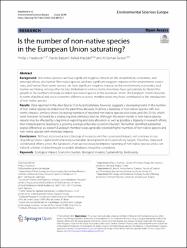Is the number of non-native species in the European Union saturating?
Citation
Haubrock, P. J., Balzani, P., Macêdo, R., & Tarkan, A. S. (2023). Is the number of non-native species in the European Union saturating?. Environmental Sciences Europe, 35(1), 48.Abstract
Background: Non-native species can have significant negative impacts on the environment, economies, and amongst others, also human Non-native species can have significant negative impacts on the environment, economies, and human Non-native species can have significant negative impacts on the environment, economies, and human well-being, among other factors. Globalisation and economic incentives have substantially facilitated the growth in the numbers of newly recorded non-native species in the European Union. The European Union’s diversity in terms of political and socio-economic differences across member states may have contributed to the introduction of non-native species. Results: Data reported in the Alien Species First Record Database, however, suggests a decreasing trend in the number of non-native species recorded over the past three decades. InvaCost, a database of non-native species with economic impacts, similarly shows increasing numbers of reported non-native species with costs until the 2010s, which were, however, followed by a plateauing and ultimately decline. Although the recent trends in non-native species reports may be affected by a lag time in reporting and data allocation as well as possibly a disparity in research efforts, their impacts persist, leading to a growing ecological but also economic burden. We further identified substantial spatial differences as western European member states generally reported higher numbers of non-native species and non-native species with monetary impacts. Conclusions: Without improved actions, biological invasions and their associated impacts will continue to rise, degrading natural capital and hampering sustainable development and sustainability targets. Therefore, improved coordinated efforts across the European Union are necessary to improve reporting of non-native species and a centralized collation of data through accessible databases should be considered.


















